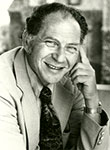Irving Lazar, professor emeritus of human service studies, dies at 86
By Ted Boscia

Irving Lazar, professor emeritus of human service studies with a lifelong focus on improving the lives of children and families through teaching, research and program and policy development, died May 1, 2012, in Nashville, Tenn. He was 86.
Born in the Bronx, Lazar developed a talent for science early in his life. In 1939, at age 13, he was chosen to participate in a science exhibit at the New York World’s Fair, followed by an opportunity to conduct experiments at IBM’s New York City laboratory. At 16, Lazar enrolled in City College of New York (CCNY) to study genetics.
His studies were interrupted in 1942 when he enlisted in the U.S. Army Air Force after the start of World War II. He served in the Allied campaigns before returning home with war injuries.
Back at CCNY, Lazar’s interests turned to psychology, particularly the well-being of children and families. He completed a B.S. in psychology in 1948, followed by a M.S. (1950) and Ph.D. (1954) in psychology from Columbia University and an internship at the Menninger Clinic, at the time located in Topeka, Kan.
After two decades in private practice and public service, Lazar was recruited to Cornell’s College of Human Ecology in 1972 as the first chair of the Department of Human Service Studies (the precursor of the Department of Policy Analysis and Management). From 1972 to 1981, Lazar led efforts to bring together the college’s social science disciplines focused on program planning and management, policy analysis and program evaluation in health, education and human service contexts. He was also instrumental in bringing the Sloan Program in Health Administration into the college.
Lazar was memorable for his nontraditional educational style. For public policy courses, he handed students copies of the federal and New York state budgets as one of the “textbooks,” valuing applied learning most of all.
In the mid-1970s, Lazar founded and directed the Consortium for Longitudinal Studies, a national group of 11 academic researchers who studied the long-term effects of early education on the lives of children from low-income families. As the public face of the consortium, Lazar presented its findings to Congress and policymakers in more than 40 states, helping to preserve funding for the Head Start Program and to expand early childhood programs in many states. He also shared his knowledge overseas as a lecturer and consultant on early childhood education in New Zealand, Japan, Singapore, Hong Kong, Germany and England.
Prior to coming to Cornell, Lazar served as associate director of the Appalachian Regional Commission in Washington, D.C.; Nevada’s associate commissioner of mental health; a reserve officer in the U.S. Public Health Service; and founder of a network of family therapy clinics in Las Vegas and Los Angeles, among other roles. He also served as a consultant to the U.S. Office of Economic Opportunity on the development and evaluation of the Head Start Program and community action agencies as part of U.S. President Lyndon Johnson’s War on Poverty.
Lazar retired from Cornell in 1991 and later served as an external faculty member at the Santa Fe Institute, where he investigated complexity theory applied to infant development.
He is survived by his wife, Jules Marquart, M.S. ’86, Ph.D. ’88, and children Kathryn, J.D. ’76, Jim and Richard.
Ted Boscia is assistant director of communications for the College of Human Ecology.
Media Contact
Get Cornell news delivered right to your inbox.
Subscribe